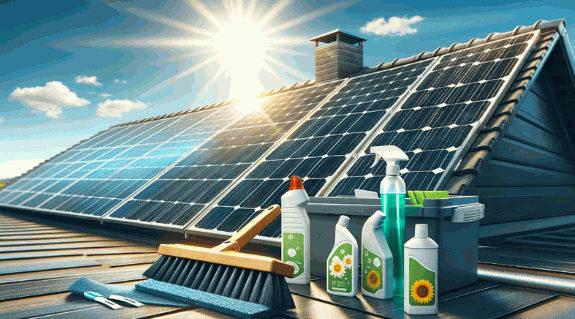Are your solar panels not performing as efficiently as they should? One reason could be the accumulation of dirt, dust, and debris on the surface.
In this article, we will explore the importance of cleaning solar panels and the most common methods used to do so. From manual cleaning to automated solutions, we will discuss the best cleaning solutions and tools required for the job.
We will provide insights on how often you should clean your solar panels, the dos and don’ts of cleaning, and essential safety precautions to keep in mind.
Stay tuned to ensure your solar panels are operating at their optimal capacity!
Gain insights: How To Clean Solar Panels On Roof

Why Do You Need To Clean Solar Panels?
Maintaining clean solar panels is crucial for maximizing energy production efficiency. Dust, dirt, and debris accumulation on the panels can significantly reduce their output capacity, impacting the overall performance of the solar energy system.
Regular cleaning not only ensures that the panels receive maximum sunlight but also aids in preventing potential damages caused by prolonged exposure to environmental elements.
Clean solar panels are essential for optimal energy conversion, enabling the panels to operate at their peak efficiency levels. By removing obstructions like bird droppings, leaves, and other debris, you pave the way for the panels to harness more sunlight and generate the electricity needed for your home or business.
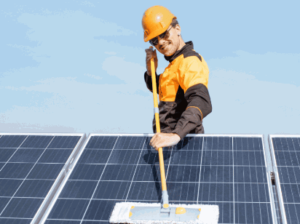
What Are The Common Methods Used To Clean Solar Panels?
There are various methods employed for cleaning solar panels, including manual cleaning, automated systems, and self-cleaning mechanisms. Each approach offers unique benefits in maintaining the efficiency and performance of the solar panel system.
Manual cleaning involves physically washing the panels using water, sometimes with the addition of mild detergents, and wiping them to remove dust and debris. This method requires human labor and time investment.
Automated systems, on the other hand, utilize robotic arms or cleaning vehicles equipped with brushes or squeegees to automatically clean the panels. These systems can be programmed to clean panels at specific intervals, reducing the need for manual intervention.
Self-cleaning technologies, such as hydrophobic coatings or automatic cleaning mechanisms, minimize the need for frequent manual or automated cleaning. These technologies can help prevent dirt buildup and maintain panel efficiency over time.
Manual Cleaning
Manual cleaning of solar panels involves using water, a soft brush, and mild soap to remove dirt and grime from the panels. It is a cost-effective method that allows homeowners to ensure the panels are clean and functioning optimally.
In the manual cleaning process, it is essential to start by rinsing the solar panels with water to loosen the debris and dust that has accumulated on the surface. Using a soft brush, gently scrub the panels in circular motions to dislodge stubborn dirt without scratching the delicate coating. Then, apply a solution of mild soap and water to effectively remove any remaining grime without causing damage to the panels. Rinse thoroughly to ensure no soap residue is left behind, which can impact the efficiency of the panels.

Automated Cleaning
Automated cleaning systems for solar panels utilize technology to provide efficient and thorough cleaning without manual intervention. Homeowners can opt for professional cleaning services or invest in automated cleaning solutions for hassle-free maintenance.
One of the key advantages of integrating automated cleaning systems is the removal of the manual labor typically required for panel maintenance. By automating the process, tasks such as removing dust, dirt, and debris from the panels become significantly simpler and more streamlined.
Moreover, professional cleaning services bring another level of expertise into play, ensuring that the panels are cleaned effectively and without causing any damage. These services often use specialized equipment and cleaning solutions that are tailored to solar panels, maximizing their efficiency and longevity.

Self-Cleaning Panels
Self-cleaning solar panels feature innovative technology that helps prevent debris buildup and facilitates automatic washing to maintain optimal performance. These panels reduce the need for frequent manual cleaning, enhancing efficiency and reducing maintenance efforts.
The technology behind self-cleaning solar panels involves the application of specialized coatings that repel dust and dirt, ensuring that sunlight can penetrate through without obstruction. Some panels are designed with a tilting mechanism that allows rainwater to wash away any remaining debris, further improving their cleaning efficiency. This automation not only saves time and effort but also maintains a high level of energy production by maximizing sunlight absorption. The advantages of self-cleaning panels extend to cost savings on cleaning supplies and labor, making them a sustainable and practical choice for modern solar installations.
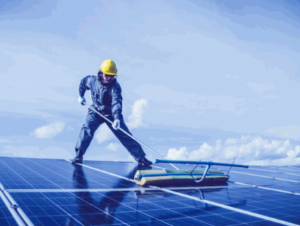
What Are The Best Cleaning Solutions For Solar Panels?
Choosing the right cleaning solution is essential for maintaining the cleanliness and efficiency of solar panels. Common options include water and soap solutions, vinegar mixtures, and commercial solar panel cleaners, each offering unique advantages in removing dirt and grime.
Water and soap solutions are eco-friendly and cost-effective, making them ideal for regular cleaning. Vinegar mixtures, often used for their natural disinfectant properties, can efficiently break down stubborn residues without harming the panels. On the other hand, commercial solar panel cleaners are specially formulated to provide a deeper clean and protect the panels from damage over time. It’s crucial to consider factors like the panel’s material and surrounding environment when selecting the most suitable cleaning solution.
Water And Soap Solution
A water and soap solution is a simple yet effective method for cleaning solar panels, offering a gentle yet thorough approach to removing dirt and grime. This cost-effective solution is ideal for regular maintenance to ensure optimal energy production.
Using a water and soap solution not only helps maintain the cleanliness of solar panels but also enhances their efficiency by allowing maximum sunlight absorption. The gentle nature of this cleaning method ensures that the delicate surface of the panels remains intact, preventing any damage that harsh chemicals might cause.
The application process involves mixing the soap in water to create a mild solution and then using a soft brush or cloth to gently scrub the panels. Rinsing off the soap with clean water is essential to prevent any residue that may affect the panel’s performance.
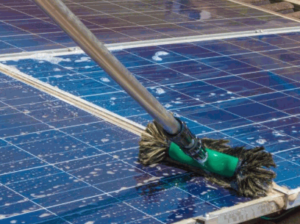
Vinegar Solution
A vinegar solution is a natural and environmentally friendly option for cleaning solar panels, effectively removing debris and grime without harsh chemicals. This solution provides a cost-effective and eco-friendly approach to maintenance.
The use of vinegar, a common household item, offers numerous advantages when cleaning solar panels. Not only is it gentle on the environment, but it also helps maintain the longevity and efficiency of the panels. By utilizing the strength of natural acidity, vinegar can effectively dissolve dirt and residue, leaving the panels sparkling clean.
The application process is straightforward and requires minimal effort. Simply dilute the vinegar in water, apply it to the panels with a soft cloth or sponge, and rinse thoroughly. Safety is paramount when working with any cleaning solution, so remember to wear gloves and eye protection to avoid any potential irritation.
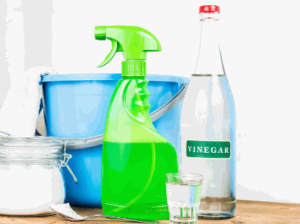
Commercial Solar Panel Cleaners
Commercial solar panel cleaners offer specialized solutions designed for efficient and thorough cleaning of solar panels. These products are formulated to remove tough stains and dirt, providing homeowners with a convenient and effective cleaning option.
One of the key benefits of using commercial solar panel cleaners is their ability to enhance the efficiency of solar panels by ensuring optimal performance. These cleaners not only remove dirt and grime but also help maintain the longevity of the panels. With regular use of professional-grade cleaning solutions, solar panel owners can significantly increase their energy output, maximizing the return on their investment. These cleaners are often environmentally friendly, minimizing the impact on the surrounding ecosystem while delivering superior cleaning results.

What Are The Tools Required For Cleaning Solar Panels?
Having the right tools is essential for effectively cleaning solar panels and maintaining their efficiency. Key tools include a soft brush or cloth for gentle scrubbing, a squeegee for streak-free drying, and a hose or pressure washer for rinsing off stubborn dirt.
Another crucial tool in panel cleaning is a bucket filled with a gentle cleaning solution or just water and mild soap to ensure thorough cleaning without damaging the panels. Having a ladder or extendable pole is vital to reach higher solar panels safely. It’s important to regularly inspect and clean these tools to avoid transferring dirt or debris onto the panels during cleaning.
Soft Brush Or Cloth
A soft brush or cloth is a gentle tool for removing dirt and debris from solar panels without causing damage. Using a soft brush ensures effective cleaning while protecting the panels from scratches or abrasions.
Regarding cleaning solar panels, gentle methods are key in maintaining their efficiency and lifespan. By utilizing a soft brush or cloth, you can safely remove built-up grime without risking any harm to the delicate surface of the panels. These tools are designed to be gentle yet effective, ensuring that your panels receive a thorough cleaning without the risk of scratches or other damage.
- When cleaning, it’s important to avoid harsh chemicals or abrasive materials that could potentially degrade the protective coatings on the panels. Opting for a soft brush or non-abrasive cloth will help preserve the integrity of the panels and maximize their energy production.
- Using a soft brush or cloth allows you to maintain a consistent cleaning routine, as these tools are versatile and can be used regularly without causing any harm to the panels.

Squeegee
A squeegee is a useful tool for ensuring streak-free drying of solar panels after cleaning. It helps remove excess water and soap residue, leaving the panels clean and clear for optimal sunlight absorption.
When using a squeegee, remember to start from the top of the panel and pull the tool downwards in a straight line, applying gentle pressure.
By using overlapping strokes, you can ensure thorough coverage and prevent streaks from forming.
Choose a high-quality squeegee with a soft rubber blade to avoid scratching the surface of the panels while effectively removing water.
Regular squeegee maintenance, such as cleaning the blade and replacing it when worn out, is essential to maintain its cleaning efficiency over time.

Hose Or Pressure Washer
A hose or pressure washer is essential for rinsing off stubborn dirt and debris from solar panels. The high-pressure water stream helps dislodge grime, ensuring a thorough cleaning process for optimal panel performance.
Using a hose is a simple and cost-effective method to maintain solar panels, as it can effectively remove lighter dirt and dust buildup. On the other hand, a pressure washer, with its adjustable nozzle settings, provides a more powerful cleaning option for tough stains and bird droppings.
The pulsating water jet can penetrate deeply into crevices and corners, reaching spots that are hard to access manually. Regular cleaning not only improves energy efficiency but also extends the lifespan of the panels by preventing corrosion and damage.
When using a pressure washer, remember to use the lowest pressure setting to avoid damaging the delicate surface of the panels. Always start from a distance and gradually move closer, staying mindful of the pressure intensity.
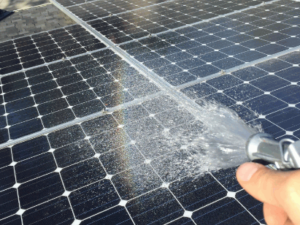
How Often Should You Clean Your Solar Panels?
Determining the ideal cleaning frequency for solar panels depends on various factors that can impact their efficiency and performance. Following a recommended cleaning schedule ensures consistent maintenance and optimal energy production.
One of the key factors influencing the frequency of solar panel cleaning is the environmental conditions in which the panels are situated. For instance, panels located in dusty areas or regions prone to bird droppings may require more frequent cleaning compared to those in cleaner environments.
Another aspect to consider is the angle and tilt of the panels. Panels installed at a steep angle or in a position where they are more exposed to debris may accumulate dirt faster, necessitating more regular cleaning sessions.
Factors Affecting Cleaning Frequency
Several factors influence the recommended cleaning frequency for solar panels, including environmental conditions, roof tilt, and proximity to dust sources. Understanding these factors is essential for determining the optimal maintenance schedule.
One of the significant environmental factors that impact solar panel cleanliness is dust accumulation. Areas with higher levels of dust, pollen, or other debris will require more frequent cleaning to maintain peak performance. The orientation of the roof plays a crucial role, as panels facing south are exposed to more sunlight and are thus more susceptible to dirt buildup.
Moreover, roof pitch can affect how water drains off the panels after rain, potentially leading to uneven dirt distribution. Factors like nearby trees or industrial sites can also contribute to the need for more regular cleaning due to increased air pollution and debris.
Recommended Cleaning Schedule
Following a recommended cleaning schedule for solar panels can help ensure consistent maintenance and optimal energy production. Homeowners should establish a routine based on environmental factors and manufacturer guidelines to maximize panel efficiency.
It is crucial to understand that solar panels require regular upkeep to perform at their best. Adhering to a structured cleaning plan not only ensures the longevity of the panels but also boosts their overall efficiency. Consider factors such as the local climate, dust accumulation, and the proximity to trees or industrial areas when defining the frequency of cleaning. By aligning with the manufacturer’s recommendations and staying proactive in maintenance, homeowners can significantly enhance the performance of their solar energy systems.
What Are The Dos And Don’ts Of Cleaning Solar Panels?
Understanding the dos and don’ts of cleaning solar panels is essential for maintaining their efficiency and safety. Following best practices can help homeowners avoid damage and maximize the longevity of their solar energy system.
One important do is to regularly inspect your solar panels for any debris, dirt, or shading that may hinder their performance.
Cleaning panels with a gentle touch using a non-abrasive sponge or cloth, combined with a mild detergent and water solution, is an effective approach.
Don’t use abrasive materials or harsh chemicals, as they can scratch the panels or cause damage to the protective layers.
Make sure to wear appropriate protective gear, such as gloves and safety glasses, when cleaning to prevent any injuries.
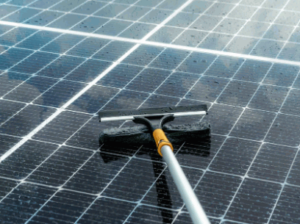
Dos
When cleaning solar panels, it is essential to prioritize safety and efficiency. Ensure that the panels are cool to the touch before starting the cleaning process to prevent thermal shock and utilize gentle cleaning methods to avoid scratching the surface.
Start the cleaning process in the early morning or late evening to avoid direct sunlight, which can cause cleaning solutions to evaporate quickly and leave streaks on the panels. Use a mixture of mild soap and water or a specialized solar panel cleaning solution for optimum results.
When climbing onto the roof to access the panels, always use proper safety gear, including harnesses and non-slip shoes, to prevent accidents. Regularly inspect the panels for any damage or debris accumulation that could hinder their performance and efficiency. Consider investing in professional cleaning services for a thorough and safe cleaning experience.
Don’ts
Avoid using abrasive materials or harsh chemicals when cleaning solar panels, as these can damage the surface and reduce efficiency. Refrain from cleaning panels during peak sunlight hours to prevent potential hazards and ensure effective cleaning.
Another common mistake to avoid is using high-pressure water jets or power washers, as the force of these tools can crack or break the panels. It’s also essential to steer clear of scrubbing the panels with rough brushes or scouring pads, as they can scratch the surface and compromise the integrity of the solar panels.
Remember not to use ammonia-based cleaners or other strong chemicals that may leave residues on the panels, impacting their performance over time. When washing the panels, a mixture of mild soap and water along with a soft sponge or cloth is sufficient for effective cleaning without risking any damage.
What Are The Safety Precautions When Cleaning Solar Panels?
Prioritizing safety precautions when cleaning solar panels is essential for preventing accidents and ensuring the longevity of the system. Homeowners should follow safety guidelines, use appropriate protective gear, and avoid risky cleaning practices.
When cleaning solar panels, it is crucial to prioritize safety precautions to minimize the risk of injury and damage. To enhance safety, ensure that the panels are completely turned off before cleaning to avoid electrical hazards. Check the manufacturer’s guidelines for specific cleaning instructions to prevent any damage to the panels. Investing in protective equipment such as gloves, goggles, and non-slip footwear is a wise decision to safeguard yourself against potential accidents.
Conclusion
Regular cleaning and maintenance of solar panels are vital for ensuring optimal energy production efficiency and system longevity. By following recommended cleaning practices, homeowners can maximize the performance of their solar energy system and reap the benefits of clean, efficient power generation.
Regular cleaning of solar panels plays a crucial role in preventing dirt, dust, and debris buildup, which can hinder sunlight absorption and reduce the efficiency of the system. Proper maintenance not only enhances energy production but also extends the lifespan of the panels, ensuring long-term savings for homeowners. Maintaining clean solar panels aligns with sustainable energy practices, contributing to a greener environment and reducing the carbon footprint of households investing in solar power systems.

